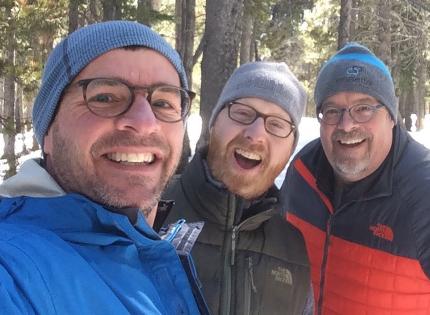Rocky Mountain Renewal

Mark Quist (left), Eric Snyder, Rick Ebbers
After wrapping up Sunday services at their churches across northern Colorado, four pastors often traveled many miles to spend time together at a retreat center high in the Rocky Mountains.
Already friends, or in the process of becoming friends, they met to share aspects of a vocation that can have its share of tensions, struggles, and joys. Sometimes life changes caused members of the group to miss an overnight, and the demands of ministry could mean they arrived late or left early.
But as they have met together several times over the past two years, they all know they have been a like-minded group who have dedicated themselves to serving God as ordained pastors.
“Being a pastor is unique work,” said Rev. Mark Quist, who serves Crestview Church in Boulder, Colo. “We have been able to find the time and space to be authentic and real with one another — and this is so important.”
Meeting together in the mountains, they could set aside the personas they find they need to portray at times as pastors. “As a pastor, there are expectations of you, and you are always striving to be a good example,” said Quist.
In aiming to serve faithfully in following Christ, he added, “you work day to day with people in their struggles. So it’s nice to be with others you can talk with about what is going on in your own life.”
Supported in their gatherings by a Peer Learning Group through the CRC’s Pastor Church Resources, the participants include, along with Quist, Don Orange, a refugee-initiative pastor at Cornerstone Community Presbyterian Church in Greeley; Eric Synder, pastor of Hillcrest Christian Church in Denver; Rick Ebbers, pastor of The Journey CRC in Longmont; and, later in the grant period, Craig Broek, pastor of The Table in Denver.
According to the Pastor Peer Learning Grant webpage, “Peer Learning Group Grants offer pastors an opportunity to gather for learning, support, prayer, encouragement, and fellowship. Groups funded to date have focused on spiritual growth, Sabbath, developing leadership within churches, contemporary culture, pastoral health, family systems theory, building strong relationships, ministry fit — and the list goes on.”
When they met for retreats, said Quist, they usually arrived on a Sunday evening, spent Monday together, and returned home on Tuesday. While together, they talked, reflected, prayed, shared meals, went hiking or snowshoeing, practiced archery, and enjoyed other outdoor activities..
“It’s good to get away, eat good food, play . . . and laugh,” said Synder, pastor at Hillcrest in Denver. “I’ve left each time together enthused and excited to dive back into ministry life.”
At one retreat, they had a focused discussion on the issue of what it takes to remain strong and healthy in ministry life. They had often touched on this topic before, but the discussion took a more formal direction when they began to formulate some principles, said Quist.
These included the need for Sabbath, which “God built into the fabric of our world and of our dependent, created being in God – absolutely necessary. . . . The path of the ministry long-haul hinges on this principle: a day (or two) of rest every seven days,” they wrote in a report detailing their experience.
In addition, they saw the need for a set of “brothers-in-arm” principles, which “require intentionality of schedule and relationship engagement with others who share in ministry life.”
Among these, they decided to adopt a hobby principal. This is the “necessity of refueling in something where creativity can be engaged and enjoyment can be found. The principle can
be fulfilled in many different ways, from woodworking to house projects and remodeling to lumberjacking in the woods. . . . [This] brings life and outlet outside of the church and ministry life.”
Quist said one of the guys is a fly fisher, and another simply likes to interact with people. He likes to be out in the mountains clearing trees for others as well as chopping down trees to make space on the property of his church.
Doing such things as this, he said, “are necessary for clearing the mind and creating space for the spirit to simply be.”
Significantly, they also came up with a spousal principle: “To nurture the marriage relationship is of paramount importance. To engage in the things that bring joy to our spouse is key. Finding joy in the joy of your spouse.”
The group also is working on shaping additional principles.
Between visits to the retreat center, they have also gathered in a central location for meeting times together, as well as meeting one-on-one in coffee shops.
But spending time for renewal in the mountains has been a highlight. Taking the time to get there, however, has not always been easy, said Ebbers of The Journey CRC. It often takes effort to free up the time to make the trip — and it can feel like work, he said.
“But once there and with these guys, that feeling would go away. It was restorative, for mind and body and soul. And it didn’t hurt that cell reception was spotty. A whole different pace took over and was indeed a respite for my soul.”
Don Orange of Cornerstone Community Church said he has deeply appreciated the chance to spend time with others who “know personally the 24/7 nature of shepherding God’s people. These guys have always listened to me [through challenging times]; they have always shared their hearts and made room for mine.”


